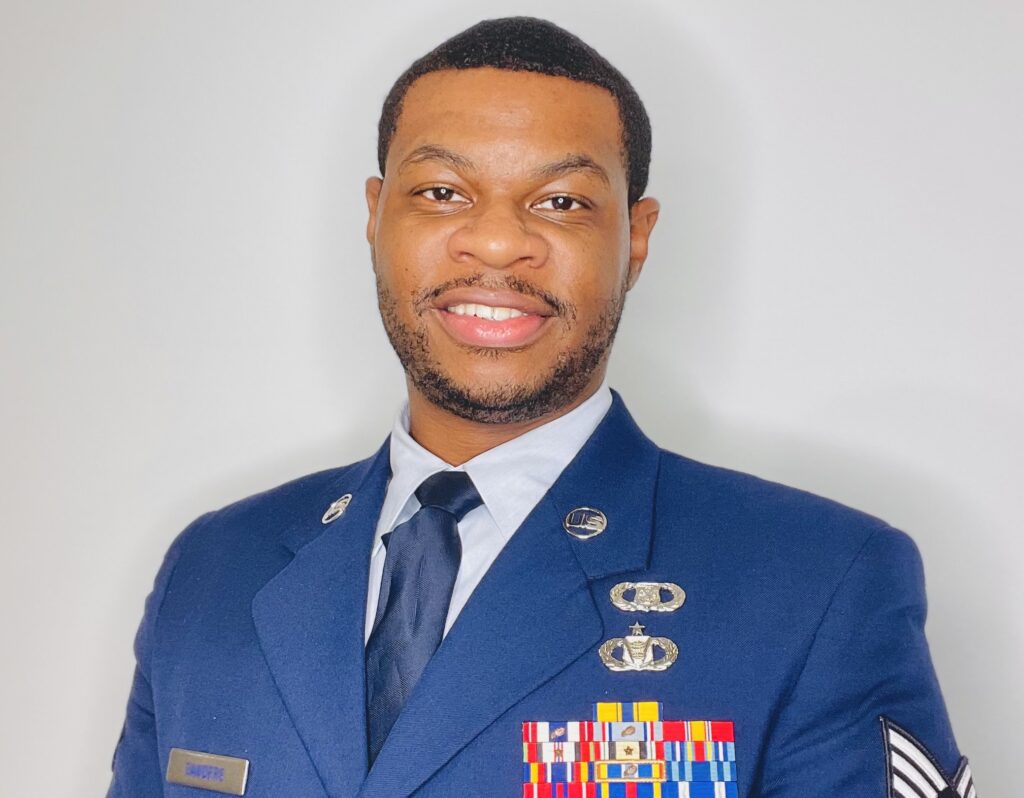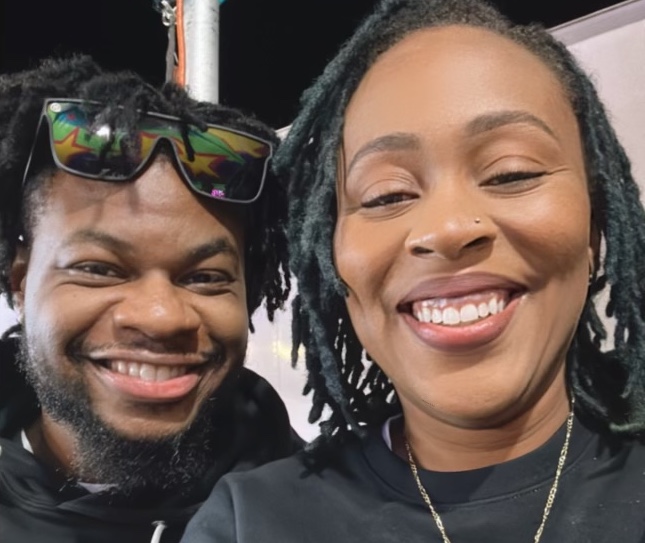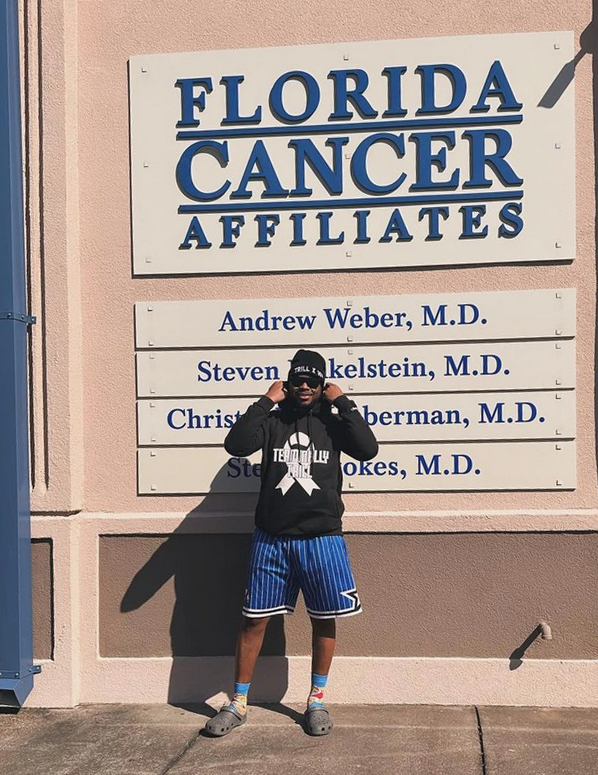
All Xavier Sanders wanted to do was to serve.
“For 14 years, I have been all around the world serving my country on the U.S. Air Force. I’m a dad. A husband. A brother. I’m a son – all of those things. And currently I am fighting stage 4 lung cancer.”
In 2020, Xavier contracted Covid and was off flying status for longer than expected. A physical revealed a spot on his lung, but it wasn’t a concern until about three months later when it had doubled in size. “That’s when all the red flags started going off,” he said.
Xavier had a biopsy in July 2022. “The biopsy went from pretty much, ‘let’s get this spot out of here’ to ‘oh no, there’s a lot of cancer.’” All of the 15 lymph nodes biopsied were cancerous. The cancer has since spread to Xavier’s liver, and weeks ago, he was told he had 20 to 30 tumors in his brain.
“When I got this surgery, the surgeon was like, there’s no way you’re this young and your lungs look that bad. You had to go somewhere to get this – the only way I’ve seen things like this is from 80-year-old men who have been working in factories their whole lives and smoking a pack of cigarettes every day. But I think of all the deployments, all the burn pit exposures that I’ve had, all the things that we burned, all the hazards and chemicals.”
In the video clip at left, Xavier talks about why advocating for service members is so important.
Although Xavier has a very supportive command team, he is concerned for his fellow service members. The military covers most health care expenses but focuses more on the short term – getting people back in to service – than long term outcomes.
“My fear is that there are other service members out there who are dealing with the same thing, and just don’t know how to voice it, or just don’t have the avenues, or just don’t have the resources to reach out. And that’s kind of where I take this fight kind of personally, almost because I don’t want any other service member to experience what I have – waiting for scans or being told, ‘oh, it’s not a big deal,’ or just sitting around and waiting, because a lot of it was just speculation. The first doctor that I went to told me my spot was from some red clay that I grew up from Tennessee, and that couldn’t have been further from the truth.”
Xavier spent a lot of time trying to be okay because he had worked hard for his career and appreciated all the opportunities the Air Force had given him. Sharing his story publicly has given him an avenue to support service members in similar situations.
“A lot of my health care is taken care of because I’m still active duty. But the younger airmen, the younger service members don’t know where to find resources. They don’t know who to talk to. They don’t know what to expect.”
The importance of caregivers

Xavier’s wife, Chelsea, has been a source of strength for him. “When I’m out of it, she’s the one in the meeting – she’s the one asking the questions. Caregiver support is huge, because having resources means she can verbalize things on my behalf. A lot of veterans don’t have that, or their caregivers don’t know where to start.”
Chelsea notes that a service member’s ability to endure can mask the pain he or she is experiencing. “I think people have a stereotypical cancer patient in their mind, and they can become insensitive or dismissive when someone doesn’t fit the stereotype.”
She noted that important symptoms may have been missed because of those assumptions. “Because Xavier walked in with a smile, they would assume that things were okay, but they didn’t know or ask. You know who got him dressed? Can he be left home alone? They wouldn’t ask those questions.”
“There probably needs to be more conversation around mental toughness, and how sometimes that’s a barrier to receiving the care you need,” she said.
> Order or download our Caregiving for a Loved One Living with Lung Cancer booklet
> Contact our lung cancer support line for help
Xavier sees more gaps in health care than there should be. “We should have help everywhere, because cancer is everywhere. People all over the world, having the same problems, having the same symptoms and experiencing the same things.”
“Cancer can be deadly, but that does not mean it’s a death sentence. Every day we get a new day to fight. There’s more than one way to be seen and be heard, and we just have to step out there and be brave – because at the end of the day we’re fighting for our lives. We’ve already signed a blank check, and the blank check is being cashed right now, and we can’t afford to just sit and just let it continue to be cashed over and over again at the expense of our lives. I want to change the narrative. I want to make a positive change and an impact.”
“Being in the military is already hard with everything that we go through with the sacrifices, and the coming and going, and all the things that come with being in the military. We need to do things in our society and our culture, especially in this realm, where we can make it easier for each other. It’s got to start somewhere, and I’m ready to start it.”
Trillionaires Only
When Xavier was recovering from lung cancer surgery, he and his supporters created a clothing brand, Trillionaires Only. His hope is to share his message and his cancer journey with the world and to show that whether you’re facing your toughest battle or chasing your biggest dream, you must always be authentic, resilient, and ambitious.
Learn more at trillionairesonly.net.

Good news for veterans
On Feb. 26, the Veterans Administration announced that all veterans exposed to toxins and other hazards while serving in the military will be eligible to enroll directly in VA health care beginning March 5, 2024. Those veterans will be eligible to enroll directly in VA health care without first applying for VA benefits.
This expansion of VA health care eliminates the phased-in approach called for by the PACT Act — meaning that millions of veterans are becoming eligible for VA health care up to eight years earlier than written into law.